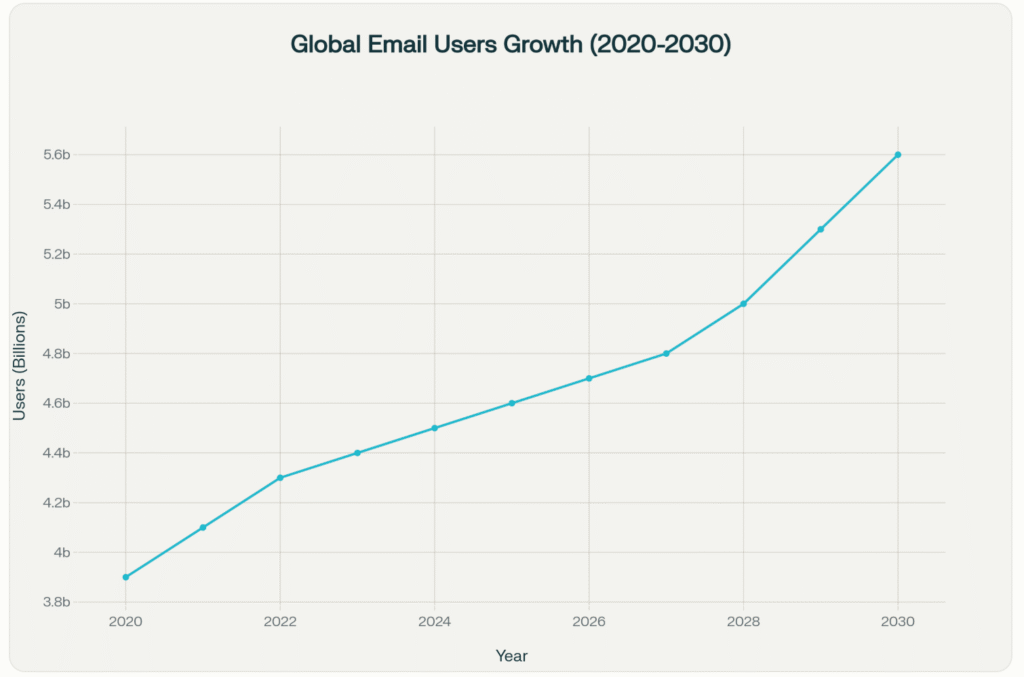Introduction
Email marketing remains a cornerstone of digital marketing strategies worldwide, with its reach expanding continuously due to the growing global user base and technological advancements. This article explores the “email marketing reach” through detailed analysis and current statistics, focusing on worldwide reach, delivery assurance, preference over social media, superior ROI, personalized strategies, and future prospects.
Worldwide Reach of Email Marketing
In 2025, email users globally stand at approximately 4.6 billion, projected to grow to 5.6 billion by 2030. This represents over half the global population, illustrating email’s unparalleled access to diverse markets. The average user engages with their inbox 15 times daily, emphasizing email as a persistent communication channel. With an estimated 376 billion emails sent every day, email marketing has immense potential for expansive audience targeting worldwide.

Worldwide Email Users Growth and ROI Comparison: Email Marketing vs Social Media Marketing (2025)
Ensured Delivery: High Email Deliverability Rates
For marketers, reaching the consumer’s inbox is crucial. Average deliverability rates hover around 83%, with premium providers like Google achieving rates above 90%. Nearly 58% of emails land directly in inboxes, while 38% appear in promotions tabs, ensuring visibility. Continued improvements in spam filtering and sender practices are further enhancing these rates, minimizing the risk of lost messages.
Preference of Email over Social Media: Staying in Inbox for Reference
Emails outperform social media in direct recipient engagement. On average, email open rates hover around 26.6%, sometimes exceeding 40%, while social media organic reach can be as low as 2-6%. Unlike social content that can be quickly lost in time-ordered feeds, emails remain accessible for future reference, increasing brand recall and facilitating decision-making. The click-through rates on emails are also significantly higher—often 50 to 100 times greater than social media equivalents—making email a preferred channel for deeper engagement.
Better ROI than Other Channels
Email marketing delivers one of the highest returns on investment (ROI) in digital marketing. For every $1 spent, marketers receive an average return of about $39 (ranging up to $42 in some industries). This far exceeds social media marketing, which yields roughly $2.80 per dollar invested. Email’s scalability and automation abilities amplify these returns, with triggered email automations contributing up to 37% of overall sales for brands.
Personalization and Segmentation Enhance Reach
Employing AI-driven personalization and segmentation enhances the effective reach of email campaigns. Personalized emails can boost click-through rates by 13% and drive up revenue by 41%. Many businesses modulate email frequency based on engagement data to maintain subscriber interest and reduce attrition, maximizing the long-term value of their contact lists and expanding their marketing reach organically.
Integration with Other Channels
Successful marketing strategies combine the strengths of email and social media. While social channels expand brand visibility and attract new audiences, email nurtures and converts leads with personalized, direct communication. Integration improves overall reach and customer lifetime value by synergizing brand awareness with conversion tactics.
Challenges and Future Outlook
Email marketing must adapt to evolving challenges such as inbox saturation, spam filtering, and privacy regulations. Nevertheless, advancements in AI, machine learning, and authentication protocols are enhancing security and campaign effectiveness. Projections suggest continued growth in email populations and message volumes, guaranteeing email marketing’s critical role through 2030 and beyond.
Conclusion
The reach of email marketing remains expansive and highly effective due to its broad global user base, assured delivery, preference for lasting communication, superior ROI, and increasing sophistication through personalization. Marketers leveraging email’s strengths while integrating complementary channels can achieve substantial business growth and sustained audience engagement.


0 Comments